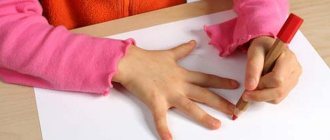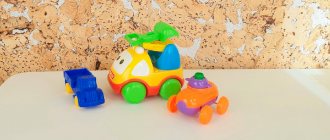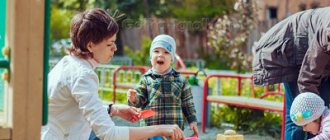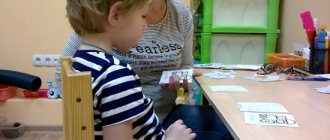Pediatricians have proven that the child’s neural network responsible for speech is associated with fine motor skills of the fingers. Therefore, any active work: modeling, fiddling with small parts on a string, finger painting will contribute to the development of the speech apparatus.
Based on this knowledge, experts have developed special toys, games with which not only develop mental abilities, but also stimulate desire and the ability to speak. They will be especially useful for children with delayed speech development. And to get the greatest effect and benefit, keep in mind that each age has its own interesting games. Therefore, toys for children’s speech development can be roughly divided by age.
Toys for speech development of babies up to 1 year old
Palm stroking and finger manipulation are suitable for infants At 3 months, the baby already notices his fingers and they arouse his interest. He looks at them, puts them in his mouth, grabs rattles and crib slats. In general, he explores everything and everyone.
When he can already sit on the couch (at 6-7 months) and fiddle with his rattles with joyful cries, it’s time to start working with him. His hand movements are still unconscious, mechanical, but the centers responsible for this and the development of speech are located in the subcortex next to each other and are interdependent. The natural desire for knowledge must be reinforced.
You can remember the simple little counting rhyme with the bending of fingers: “The magpie-crow was cooking porridge...” . This is suitable for babies 6-7 months old. At this age, the above centers begin to interact.
Various small objects will also develop motor skills: beads, buttons, pens, but you need to make sure that the baby does not put everything in his mouth. The interaction of the centers is also explained by the fact that the fingertips themselves emit impulses that send a signal to the speech center and contribute to its development.
Toys for children up to one year:
- Pyramid (from 6 months) - perfectly develops baby's vocabulary and motor skills. With it, the child will quickly master the concepts of “big-small”, get acquainted with sorting, learn to compare and recognize colors. But the pyramid for this age must be correct - have an even core that is the same throughout its entire thickness, no more than 5 rings, holes of the same diameter, and a stable base.
- Balls (from 6 months) - the greater their variety in color, size, color and properties, the better. They will help the baby compare, understand colors, sizes. And their different surfaces (smooth, pimply, hard, soft) will also develop tactile sensations.
- Cubes (from 7 months) - the set can contain a variety of shapes (bricks, prisms, cylinders). Helps develop fantasy and imagination.
- Car on a string (from 7 months) - pulling a toy with a string will teach you to draw conclusions about cause-and-effect relationships. And later, at 8 months, it’s good to have a dump truck. The baby enthusiastically spins the wheels, and the car carries toys, throws out garbage, and avoids obstacles. That is, the child acquires concepts of space, he begins to operate with prepositions and prefixes.
- Doll (from 8 months) - both boys and girls need a regular doll. After all, this is a projection of a person in the toy world. On it, the child will learn to show body parts, items of clothing, and expand his vocabulary of nouns. A doll can help play out everyday situations.
It may be interesting: How to make play dough with your own hands.
Toys that develop a child’s speech after 1 year
The following toys can be identified in this category:
- Matryoshka - its purpose resembles a pyramid, but the level of development is more complex. A child can manipulate it; it will help them master ordinal numbers, adjectives and prepositions.
- A sorter is a great toy for development, where you need to sort objects according to different criteria. In the first sorter, it is better to have no more than 3 simple-shaped holes. Even this number will help the child distinguish and correlate the shape and size of figures with their image on the plane. The sorter will help develop logic, visual memory and fine motor skills. For an older child, you can buy a sorter that is more complex in the number of holes and shape.
- Puzzles - recommended from 2 years of age. Not only children, but also adults love them. Puzzles are good for a child because they perfectly develop fine motor skills, introduce the child to the concepts of part and whole, and develop perseverance and logical thinking. For little ones, you need puzzles with a small number of elements, maximum 8–15, and preferably soft ones. With age, structures can become more complex up to 1–2 thousand elements. Puzzles vary in design and are always colorful and educational. They are comparable to a constructor.
- Dishes - food is extremely important for a person; hunger and satiety are associated with it - two basic needs. This is why games with dishes are so entertaining and educational. Here you can create stories that stimulate speech development. Remember the “mother-daughter” game. Children's dishes involve fine motor skills and develop sensory sensations.
- Figurines of domestic and wild animals, toy vegetables and fruits, and dolls are the most popular toys for speech development. They reproduce the real world and perfectly complement the game with dishes. The main thing is to remember that toys should have a natural shape and color. The toy frog should be green, not blue, so that there is no distortion of concepts and emotions. Speech is indispensable here. The kid gives the characters names, speaks for them, composes stories and settings. And this is nothing more than practicing possessive adjectives, studying and memorizing body parts and names of animals, classifying them according to various criteria, and composing descriptive stories. Real activity is imitated and coherent speech, imagination and thinking are formed.
- Constructor. This toy always gives a powerful impetus to the development of imagination. The child begins to express himself and do this from childhood. Fortunately, today there are a huge variety of designers, for every taste - block, metal, magnetic, even in the form of Velcro mats, the parts of which are attached to the base carpet. Children's construction sets usually depict a specific technical, real-life model: a tank, an airplane, a car, a boat, etc.
Montessori Games
The system of the Italian doctor and teacher Maria Montessori is very popular in Russia. She offers toys that develop knowledge of the world.
Typically recommended:
- Lacing games. Designed to develop fine motor skills and memory. The lace is threaded through a specific object with holes (cheese, button, shoe). Sometimes a needle is present for relief. This is a kind of modification of the pyramid. Lacing games for older children are different story games. For example, the staging of “Turnip”. A fairy tale is read to the child and, with the help of his mother, he must connect with a cord one by one all the participants in the events (grandmother, grandfather, bug, etc.)
- Insert frames. The elements must be the same color and fit evenly into place. It is somewhat reminiscent of a sorter, but more complicated.
Editor's Choice
alilo “Smart bunny”
alilo “Smart bunny.”
Photo: market.yandex.ru “Smart bunny” alilo is a great helper for mom. The toy is intended for children from 0 years old, and a one-year-old baby will be able to launch the functionality himself. This educational toy is made in the shape of a night light, which will help your baby fall asleep calmly. The bunny knows 30 songs and 25 fairy tales; he will teach the child to recognize colors (there are educational cards for this).
The manufacturer took care of the child’s safety: the protruding bunny ears are made of soft material and can be chewed. The toy is charged via a USB cable and runs on a built-in battery, so mom does not need to worry about purchasing batteries and will always have an indispensable assistant at hand. The toy will not lose its functionality for a long time: when the baby knows all the fairy tales and songs by heart, you can teach him to sing along with the Bunny or tell it along with him.
Main characteristics:
| Interactive Features | speaks, speaks Russian and English, sings |
| Peculiarities | night light |
| Material | plastic |
| Developmental functions | foreign languages, ear for music and sense of rhythm, study of colors |
| Dimensions (LxWxH) | 5.30×6.10×16 cm |
| Weight | 0.19 kg |
Advantages and disadvantages
High impact resistance, rich sound, easy to operate, great functionality, light weight
With active use, drawn elements may be erased; frequent switching on/off leads to jamming
show more
Toys for the development of speech breathing
The development of speech breathing improves articulation, diction, and helps to pronounce sounds correctly. All people speak while exhaling, which sets in motion a mechanism called sound. Without speech breathing, a person will not be able to speak.
Toys that allow you to develop speech breathing:
- Aeroball is essentially a simple speech therapy simulator in the form of a wooden tube with two holes and a foam ball. The child blows air into the hole for as long as possible so that the exhalation is both strong and can hold the light ball in the air. It turns out to be an exciting, funny game that really improves speech breathing. A stream of air from the baby allows the ball to fly up and stay in place. This fascinates the child. The point is to hold the ball so that it does not fall to the floor. That is, the child must control the flow of the air stream and blow with different strengths - stronger, weaker, long or short, etc.
- “Blow the Ball” from BondiBon is needed not only for the development of speech breathing, but also for visual-motor coordination of movements. The ball moves in a circle with a stream of air, the task is to prevent it from falling. If he goes astray, he must start all over again. The toy is more suitable for children with impure speech. Perfectly develops the articulatory apparatus. Keeping the ball balanced is difficult, but possible. It is better to buy this game for a child over 3 years old. It makes no sense before.
The list of toys is huge, but they need to be chosen according to a specific situation. It is not necessary that there be many of them. Intuition and the help of a specialist will ensure success in your child’s speech development.
LiveInternetLiveInternet
A book with opening elements for little explorers. The poems are riddles, specially composed by the wonderful Natalya Baraban and me for curious kids.
Often parents of children complain that the child cannot look at the pages of books for a long time, they do not even have time to read the text. And this is quite natural. A child from one to three years is at the stage of object-manipulative activity. He still does not know how to observe, examine. He learns most of the world through interaction with it. What actions are available to him with a regular book? That's right, flipping! So it turns out that what attracts him most in a book is the ability to turn the pages. Listen, analyze, consider - children need to be taught all this.
If the child is not a passive listener and spectator, but an active participant in the lesson, then it is easier to maintain attention and the result is better. Books with interactive elements (windows, taffy, sensory areas, etc.) help the baby learn to look, maintain attention, develop perception, thinking and fine motor skills. It is for such children that this educational felt book with secrets was created. Another big plus is that such a book is more difficult to tear and can be washed.
The book includes poems specially created by me and Natalya Baraban for children from 1 to 3. They are great for kids who are just learning to speak, listen to books and look at pictures. Each poem is both a riddle and an exercise in onomatopoeia. The simplest words: meow, ko-ko, zhzh, can be repeated over and over again while reading a book. The pages are waiting to be discovered. What's under the tree? Mushroom! And the hedgehog hurries to find him. Who's hiding in the leaves? Page by page, the child learns to look at images, gets acquainted with the world around him, and remembers new words and prepositions! We develop thinking and speech, perception and memory, as well as tactile sensations and fine motor skills!
.
New Year's holidays are getting closer! And it’s time to start keeping an “Advent calendar” or a calendar of the upcoming holiday, a New Year’s calendar. There are tons of great examples of calendars on the Internet! I wanted to make my own.
My felt calendar is only 7 days long. Traditional calendars are designed to last a month, but I can't imagine a baby surviving that long. A weekly calendar is perfect for young children. You can wait for New Year or Christmas.
So, in front of you is a house with 7 pockets: The door has a button, there is a pocket in the porch; A window with a button with a pocket in the wall below; Velcro attic window; Pipe; Large box with a gift; Small box with a gift; Christmas tree with a pocket on the side.
Very small candies or chocolates can be placed in these pockets, and you can also put notes with surprise words, stickers, or pictures.
Felt toys for the fairy tale “Ryaba Hen” will help you organize a home theater and develop your child’s speech in a playful way. The simple text and plot of the fairy tale allow you to play with even the smallest children. All the characters are well known to kids: grandmother, grandfather, chicken and mouse. If the baby does not speak yet, he will be able to imitate the characters with simple sounds: pipi, coco, bang! You can play with both finger toys and independent flat toys. You can hide an egg in a chicken. The hut book will help to play out the plot. Children will love opening the door, looking through the window, and ringing the bell. The book will serve as an excellent setting for fairy tales and games on everyday themes from the life of the Russian village. The finger theater “Ryaba Hen” and the hut book serve not only the development of the child’s speech, but also fine motor skills: we unbutton and fasten the button on the door, tie and untie a bow, put toys on the fingers, show movements according to the text of the fairy tale.
Once upon a time there lived a grandfather and a woman, and they had a chicken, Ryaba.
The chicken laid an egg, but not an ordinary one, but a golden one.
Grandfather beat and beat and didn’t break it, the woman beat and beat and didn’t break it. The mouse ran and waved its tail: the egg fell and broke.
The grandfather is crying, the woman is crying, the chicken is clucking: “Don’t cry, grandfather, don’t cry, woman. I will lay another egg for you, not a golden one, but a simple one.”
Dominoes are one of the simplest and most accessible educational games for preschoolers. There are a large number of variants of this game: classic with dots, with paired thematic pictures, verbal, etc. Sensory dominoes are an excellent game for developing tactile perception, ideas about color, attention and thinking.
The child is faced with the difficult task of distinguishing circles that are similar in color but different in texture. During the game, visual and tactile analyzers are used. With this domino you can learn not only basic colors, but also get acquainted with shades. The colors are chosen very closely, but they are different, and you can discuss with your child which color is lighter and which is darker.
The rules of the game “Sensory Dominoes” are that you need to find circles of the same color and texture and build a chain of dominoes. The cards are distributed among all participants in the game, and a row is laid out in turn. The one who has no cards left wins.
For children under 3 years old, it is good to use a simpler type of domino game. Look at the cards, study different textures, build a snake in different directions. This domino has 16 playing cards, which include a set of four primary colors: red, yellow, blue, green; and four types of fabric: felt, fleece, faux leather, cotton. The base of the domino is felt.
You can make this “Sensory Domino” with your own hands from scrap materials. The most important condition is that the material is different in texture and similar in color. It can be felt, fleece, velvet, oilcloth, leather, fur, corduroy, silk, cotton, etc. The basis of the cards is felt. But you can also use cardboard as a base, then you don’t have to sew the cards and can simply glue them together.
To make the game "Dominoes" we will need: different materials for cards and felt or paper for the base.
Cut out 2 rectangles 6cm by 11cm. One rectangle with two holes with a diameter of 4 cm.
We prepare rectangles 5cm by 5cm from different fabrics.
There can be any number of elements. The main condition is that there must be 2 elements of each type of fabric. Pay careful attention to the distribution of sensory elements so that you can lay out the cards sequentially.
We lay out two types of fabric on a rectangle and cover it with a piece with round holes on top.
We sew the card around the perimeter and along the contour of the circles.
We make the desired number of cards and play.
What's New Year without a Christmas tree? And what is a Christmas tree without toys? For many parents, it’s a big problem to decorate the Christmas tree, but follow safety rules. Felt toys are perfect for such children's Christmas trees and holidays. Traditional bells, balls, gifts and funny animals will decorate the New Year's guest and bring a holiday to the house. Making Christmas tree decorations with your own hands is pleasant and interesting! Use the toy pattern for 30 rubles.
It is widely known that the development of fine motor skills contributes to the development of speech. There are a huge number of games and toys for developing fine motor skills, but in essence, any finger action is already useful. The development of small movements of the fingers contributes to the maturation of speech zones in the cerebral cortex. When the baby performs conscious movements subordinated to a specific goal, masters new techniques, the speech function also develops.
The development of speech through fine motor skills is an indirect result. And self-service skills directly depend on the level of development of fine motor skills. It turns out that when we teach a child to eat, wash his hands, dress, fasten buttons, tie shoelaces, we not only adapt him to life, but also contribute to the development of speech. Clothespins are a household item that perfectly develops coordination, finger strength, and prepares a child for writing. You can help your mother by hanging laundry, you can decorate the room with pictures, attaching them with clothespins to a string, or you can play with clothespins.
Games with clothespins are very useful. They develop fine motor skills, prepare the child’s hand for writing, and promote speech development. Simple clothespins are great for play, leaving room for the imagination! I collected the most popular bases for games with clothespins: cloud, sun, Christmas tree, hedgehog, spider, men and made them from felt. You can come up with interesting stories with these toys. Clothespin by clothespin, word by word, and you get a game.
Rainy morning.
The children sat at home and waited for the sun.
The rain has stopped, you can go for a walk.
How many interesting things can be found in the forest!
Spider, hedgehog...
Who else lives in the forest?
The bases can also be made from cardboard; pieces of linoleum or other dense material work well. Templates can be downloaded here. I made them for small decorative wooden clothespins (3.5cm), to play with regular clothespins, just enlarge the pictures 2 times.
Educational felt toy for children. Will teach you how to unfasten and fasten buttons and Velcro. A train and carriages with buttons on which you need to fasten the wheels. Each window has Velcro to which the driver and passengers – the animals – are attached.
Build a steam locomotive with your child so that the fun train will take the animals for a walk. Who will be driving today? You can swap toys and change passengers.
We develop fine motor skills, hand-eye coordination, speech, and learn to follow simple instructions. This train is an indispensable toy for teaching literacy. Dividing words into syllables, sound-letter analysis are complex exercises that require repeated repetition and consolidation. Doing this in game is much more interesting. Each carriage can have a corresponding sound, letter or syllable. A similar task can be found in almost every primer, but playing with a toy is much more attractive than looking at a picture.
How many syllables are in the word FISH? Our train with two carriages sets off. Let's add the syllable KI! And there are already three carriages on the train, and FISH-BA-KI are traveling. How many carriages does it take to transport a cat? You can play with the train on a table or attach it to a carpet printer.
Make a train for your child or students.
https://shillopop.com









